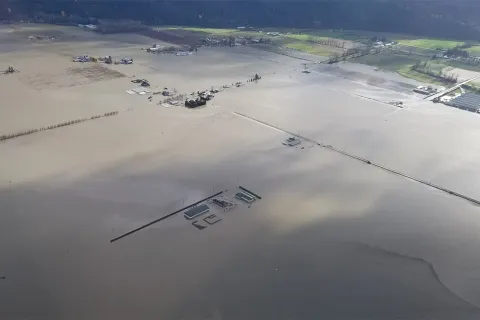New provincial funding will advance research by the UBC Disaster Resilience Research Network

Twelve different projects across UBC, including nine at the Faculty of Applied Science, are part of a $450,000 funding boost from the Province to help advance approaches in disaster and climate risk assessment and management in B.C.
As part of the funding, the UBC Disaster Resilience Research Network will also form an academic advisory panel to provide the Province with expert input, as the B.C. Ministry of Emergency Management and Climate Readiness embarks on provincial disaster and climate risk and resilience assessments.
“At UBC we have an incredible group of world-leading experts across the natural, applied and social sciences working to improve our understanding of disaster risk and build resilience,” said civil engineering assistant professor Dr. Carlos Molina Hutt, co-lead of the Disaster Resilience Research Network and principal investigator on this contribution agreement with the Province.
“Integrating the latest research into policy at the provincial level means we can help communities across British Columbia prepare for and reduce the risk of seismic and climate-driven hazards. We're very grateful to the support from the Province through the Ministry of Emergency Management and Climate Readiness.”
“We know that B.C. is prone to seismic activity and other emergencies exacerbated by climate change,” said Bowinn Ma, Minister of Emergency Management and Climate Readiness. “This research will result in important insights and strategies to reduce risk and better protect people and communities. By working together, we will be better prepared for the future – and I’d like to thank the UBC Disaster Resilience Research Network for being an important partner in this effort.”
Preparing for disasters
In the past two years alone, B.C. has experienced some of its worst weather events to date including an unprecedented heat dome that led to over 600 deaths, record floods and the worst wildfire season on record.
“These recent disasters have highlighted the need for communities to enhance their resilience to a wide range of hazards as severe weather becomes more frequent as a result of climate change,” said Molina Hutt. He added that in addition to climate-related hazards, people in high seismic regions need to be aware of the ever-present threat of a major earthquake in the province, including ‘the Big One,’ which could expose parts of coastal B.C. to tsunami waves.
The 12 research projects are working on new approaches to quantify and manage these risks and contribute towards disaster resilience. They are led by experts in engineering, urban planning, geography, and other disciplines who are part of the Disaster Resilience Research Network.
Research projects
Disaster Resilience Research Network
Molina Hutt and anthropologist Dr. Sara Shneiderman created the UBC Disaster Resilience Research Network in recognition of how disaster resilience research can directly contribute to local and regional mitigation strategies in B.C.
The network, funded by a university grant for catalyzing research clusters, brings together disaster risk and resilience researchers across both UBC campuses to jointly share research with policymakers.
“Our network is well-positioned to engage with active policy debates around disaster preparedness and response which are inherently both technical and social challenges, and we are always open for more UBC experts in the field to join us,” said Molina Hutt.
“Our work is tremendously more powerful as a network than working in silos. Working together enables us to advance multi-hazard assessment and mitigation in support of an inclusive and equitable development of just disaster risk management in B.C.”






